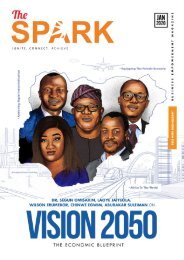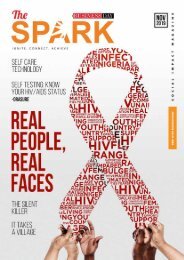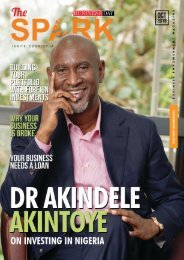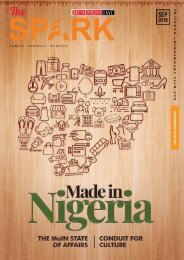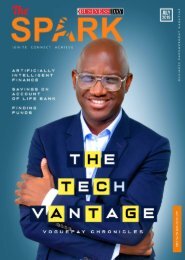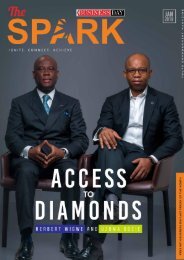You also want an ePaper? Increase the reach of your titles
YUMPU automatically turns print PDFs into web optimized ePapers that Google loves.
The Spark | Ignite / Connect / Achieve<br />
www.thesparkng.com<br />
From Private Sector to Public Servant<br />
The Honourable Minister, Okechukwu<br />
Enelamah sits as Vice-Chair<br />
on the Presidential Enabling <strong>Business</strong><br />
Environment Council. He has been<br />
responsible for the Industry, Trade and<br />
Investment portfolio in the Federal<br />
Cabinet, something he has done for<br />
about 4 years.<br />
Being part of the team driving the PE-<br />
BEC’s mandate has come as a follow-up<br />
to many years of leadership in the private<br />
and public sector. Dr. Enelamah<br />
has always carried a deep-seated interest<br />
for matters of governance and<br />
service.<br />
“I have always been interested in nation-building<br />
and governance - what<br />
it takes to build a better country. Prior<br />
to this position, I was very involved in<br />
a lot of the public-private think tanks<br />
such as the Nigerian Economic Summit<br />
Group. Also, in my own industry, we<br />
had tried to engage not just the government<br />
locally, but also foreign governments<br />
on issues pertaining to promoting<br />
investments. It was against that<br />
backdrop that I was invited to join the<br />
cabinet of the current government.”<br />
The Importance of an Enabling Environment<br />
When asked about the motivation that<br />
brought the PEBEC into being, the<br />
Minister speaks passionately about the<br />
collective burden shared by citizens in<br />
wanting to see a better country.<br />
“I returned fully to Nigeria in 1998 to<br />
start Capital Alliance Nigeria and I<br />
joined the National Economic Summit<br />
Group (NESG). Upon my return, Vision<br />
2010 was just wrapping up and the<br />
need for an enabling environment was<br />
a recurring theme.<br />
If you had asked the private sector<br />
about the one thing they needed the<br />
government to do for them, creating an<br />
enabling environment usually ranked<br />
high amongst other things. So when<br />
I was asked to join the government,<br />
particularly when I was given the Industry,<br />
Trade and Investment portfolio<br />
to look after, it was clear to me what<br />
Nigerians wanted from us. His Excellencies,<br />
the President and Vice President,<br />
who chairs the Economic Management<br />
Team, also believed this was a priority<br />
and that it was important we focused<br />
on this.<br />
“I have seen exemplary<br />
performance from these<br />
partners, and I do believe this<br />
is where the new Nigeria will<br />
come from - engaging the<br />
citizenry and working together<br />
to build a better country.”<br />
In a bid to formalise the approach to<br />
addressing this as a priority of the administration,<br />
the President established<br />
the Presidential Enabling <strong>Business</strong> Environment<br />
Council (PEBEC), with His<br />
Excellency the VP as Chair of the Council<br />
as directed by the President, and me<br />
as Vice Chair. The goal of the Council is<br />
to reduce the bureaucratic bottlenecks<br />
to doing business in Nigeria and move<br />
Nigeria upwards on the World Bank’s<br />
global competitiveness index. The Enabling<br />
<strong>Business</strong> Environment Secretariat<br />
was also created to implement the<br />
mandate of PEBEC, which Dr. Jumoke<br />
Oduwole was appointed to oversee .”<br />
Tangible Reforms<br />
It’s very important that the impact of<br />
the government’s activities cascades<br />
down to the people, and positively affects<br />
the standard of living of the average<br />
Nigerian. Dr Enelamah spoke on<br />
just how tangible PEBEC’s reforms are.<br />
“I just came from a stakeholders’ forum<br />
that took place in Lagos. One person<br />
spoke about the small claims court,<br />
which is a court set up for small and micro<br />
enterprises to settle disputes without<br />
going through the bureaucracy of<br />
the conventional court system, which<br />
can be a long process and equally expensive.<br />
The whole objective therefore,<br />
is to help people settle disputes in a<br />
way that is not cumbersome.<br />
At this forum, I heard testimonials of<br />
the successes of the small claims court,<br />
which made things real for me. People<br />
are allowed to represent themselves<br />
and they try to wrap every case up<br />
within 60 days. We also had the judge<br />
in charge of this give a report to the<br />
people on the cases they had successfully<br />
closed. These were very impressive<br />
numbers, but even moreso, the accountability<br />
and sense of responsibility<br />
I witnessed is outstanding.”<br />
Speaking about the Corporate Affairs<br />
Commission (CAC) and the Companies<br />
and Allied Matters (CAM) Bill, which is<br />
now before the President for assent,<br />
Dr Enelamah stated that there are a<br />
number of provisions which will make<br />
it progressively easier to register businesses,<br />
incorporate companies, and file<br />
returns for companies in Nigeria. Recent<br />
reforms delivered, driven by automation,<br />
already make it possible for a<br />
business owner to incorporate a business<br />
within 24 hours, reducing overall<br />
costs significantly.<br />
Pausing on just those two, it is important<br />
to highlight that these changes<br />
came about by the motivation of PE-<br />
BEC and collaboration with several<br />
ministries, departments and agencies.<br />
“I have learned that Nigerians are actually<br />
not opposed to rendering service<br />
to their fellow citizens; it is just<br />
that what gets measured, gets done.<br />
Just the fact that there is a defined<br />
initiative, and that the country is paying<br />
attention is motivating people to<br />
work. I have seen exemplary performance<br />
from these partners, and I do<br />
believe this is where the new Nigeria<br />
will come from - engaging the citizenry<br />
and working together to build a better<br />
country.”<br />
Connecting with Stakeholders<br />
It is clear in conversing with the Honourable<br />
Minister that the work done by<br />
the PEBEC cannot be effectively carried<br />
out without partnerships and collaboration<br />
on different levels.<br />
“Engagement with stakeholders is<br />
core, and central to what we are doing.<br />
We have to use multiple mechanisms<br />
to achieve this. One of the more important<br />
mechanisms today is technology,<br />
and that informed the delivery of an<br />
initiative called reportgov.ng, which is<br />
an app and web-based portal that enables<br />
citizens make complaints about<br />
any issue they encounter when dealing<br />
with government agencies and get a<br />
response within 48 hours. It’s something<br />
people need to know about.<br />
We are also trying to attract private<br />
players as partners, because PEBEC is<br />
not about the government - it is owned<br />
by all of us. That is why some of the<br />
team in EBES are seconded from the<br />
private sector and other organisations.<br />
The whole idea is that when they come<br />
in, understanding what the issues are,<br />
they are able to contribute to problem-solving.<br />
They also retain their relationships<br />
in these organisations in such<br />
a way that we can get first-hand information<br />
on the impact of the reforms.”<br />
Challenges<br />
Every great initiative faces challenges<br />
and the Minister did not shy away from<br />
speaking about these.<br />
“The first one I will highlight is communication<br />
and engagement with the<br />
stakeholders. We have found that it is<br />
one thing to have good intentions and<br />
implement them, but the beneficiaries<br />
must also be aware they can receive<br />
the service and be seen to have received<br />
the service. As a secondary consideration,<br />
that also ties into the World<br />
Bank Ease of Doing <strong>Business</strong> Ranking<br />
because what is assessed are improvements<br />
that have actually been validated<br />
by the private sector. This means we<br />
must engage if we want the changes<br />
we have worked on to be enjoyed by<br />
the citizens and reported, which is why<br />
initiatives like the stakeholders’ forum<br />
and this publication are so important.<br />
We must get the word out.<br />
Another challenge is that we collectively<br />
need is to develop a culture of<br />
service. If we deal with the attitude<br />
of inertia by understanding that what<br />
gets measured gets done, and more<br />
people are accountable while engag-<br />
20 @the<br />
sp<br />
ark<br />
ng





